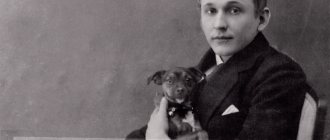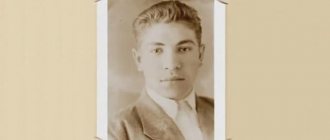Childhood and youth
The artist is Jewish by nationality, born and raised in St. Petersburg, graduated from the Anichkov Lyceum, where his father taught mathematics. He studied poorly; he was given positive grades only in history and literature.
Highly erudite and with aristocratic manners, Molochnikov’s entourage was guided by the principle of not living according to established patterns. Therefore, Alexander is in no hurry to acquire a wife, children and substantial real estate at any cost. He loses his passport regularly once a year, and at one time there was only a bed in the apartment.
After his parents’ divorce, the boy and his journalist mother went to America for a couple of years. At school in Jersey City, Sasha was the only student with light skin, which caused certain difficulties. But, as the actor admitted in an interview, the great country provided an unforgettable experience.
Molochnikov Sr. now lives in St. Petersburg with a new family. Alexander has a half-sister.
View this post on Instagram
A post shared by Moskvich Mag (@moskvichmag) on Mar 1, 2020 at 1:30am PST
Actor Alexander Molochnikov
The artist staged his first performances at the age of 3. He once joked that he couldn’t vouch for his own psyche, since at the age of 11 he watched “Letter Without an Address” by Kim Ki-duk, later became interested in the work of Lev Dodin and auteur cinema, and in the theater he was eager to see productions, which he even then assessed as terrible.
After graduating from the Lyceum, Molochnikov entered GITIS, into the acting and directing department under Leonid Kheifets. During the entrance exams, the young man had the audacity to tell the master that he was coming to him because Sergei Zhenovach taught for him. Alexander was so impressed by his project “Boys”.
A few years later, the founder of the “Theatrical Art Studio”, who took the place of the late Oleg Tabakov, forced Molochnikov to leave the Moscow Art Theater, forbidding him to stage “The Seagull”.
Now I live...
In Moscow, in the Pokrovka area. It’s difficult to say why I chose this particular area, given that in general I did not want to live in Moscow. Living here for a long time, I essentially lived somewhere else. At first, four years exclusively inside GITIS, in the rehearsal hall, and in the institute dormitory. Then for several more years it was the same - inside the Moscow Art Theater. And only recently I started living in Moscow and was horrified. Because for almost half my life I live in a city that I don’t like. There are a number of reasons for this. Moscow is some kind of shapeless vessel for me. There is no selfhood here at all, or rather, it is the selfhood of a large village. Just look at all these names - Sivtsev Vrazhek, Krivokolenny. I understand - Ryleev, Pestel, Decembrists, this is a different matter.
Personal life
Alexander is passionate about his work and career in the field of cinema and theater, his personal life is relegated to the background. That is why there were rumors about the actor’s unconventional orientation. However, there were some hints of romantic interests. But even then, talking about the girl, Molochnikov was glad that she lived far away, in England, and would rarely see each other.
He was credited with a relationship with Taisiya Vilkova, his partner in the film “Champions.” Those who saw the duet of Alexander and Svetlana Khodchenkova in the road movie “Runaway to Arizona” and read enthusiastic comments on joint photos on Instagram said that people who feel nothing for each other do not play so piercingly and purely. However, Molochnikov claims that he knew Svetlana little, and after the film they became friends.
View this post on Instagram
A post shared by Actress/official page (@svetlana_khodchenkova) on Apr 14, 2020 at 1:00am PDT
Alexander Molochnikov and Svetlana Khodchenkova
The promising bachelor is compared with his French colleague Louis Garrel, the same “multi-stationist” in terms of creativity. A fashionably dressed, flexible guy with a height of 181 cm would make a good fashion model. But it’s better not to start conversations about glamor, social life, publicity with Alexander. All this is tinsel and evil for him.
The artist’s main hobby is hitchhiking. Molochnikov often sets off on a journey with almost no money. For example, he crossed Africa with just $250 in his pocket. Such extreme trips help to free your head from thoughts, better understand the real life of the host country, see ordinary people, and not rely on the opinion of tourist guides.
Theater
While still studying in the school studio, organized by the actors of the Comedy Theater named after N.P. Akimov, Alexander appeared on the stages of the “Baltic House” and the Theater named after V.F. Komissarzhevskaya. As a teenager, he played with Irina Mazurkevich and Anatoly Ravikovich.
After university, the young man was invited to four theaters, but not to the Moscow Art Theater. I had to get to Tabakov through a competition. The actor made his debut in the role of Vronsky in the play “Karenin” and received first prize for his participation in the production of “The New Sorrows of Young V.” Kirill Serebrennikov involved Molochnikov in “Forest”, Evgeny Pisarev - in “Pickwick Club”.
And when Alexander independently staged two performances, the cabaret-style war drama “19.14” and the rock musical “Rebels,” people started talking about him as one of the most talented young directors. Molochnikov’s creative biography has reached a new level.
In 2019, he set his sights on the Bolshoi Theater, where he performed in a genre of opera that was unexpected even for himself. Put “Phone. Medium" suggested the management. And Alexander, who calls himself a non-musical person, took a risk.
Madness
The director goes remote
Watch trailer
Director : Alexander Molochnikov
Starring : Evgeny Stychkin, Igor Vernik, Maxim Matveev, Aglaya Tarasova, Kristina Asmus, Alexander Molochnikov, Alexandra Remizova, Lyudmila Khmelnitskaya and Grigory Vernik
Photo: Still from the series
The main character of Alexander Molochnikov's comedy series "Madness", a director from Moscow (Molochnikov), is preparing to stage a new play. Everything is hampered by the self-isolation regime: its actors are sitting at home, and the director himself is generally abroad. As a result, a resourceful director organizes rehearsals remotely in order not to waste time and show the performance immediately after restrictions are lifted. Of course, the situation quickly gets out of control.
The creators decided to make a comedy about life in isolation, playing up various everyday situations and adding expressiveness to the image of the young director. The actors play themselves here, which blurs the line between their performance and reality. In at least one of the characters, the viewer definitely recognizes himself: someone cannot find a place for themselves due to boredom, someone cannot cope with stress, someone is about to have a child, and someone is separated from their other half.
There are eight episodes in total. Three episodes have already been released, the rest will appear once a week in the KinoPoisk HD online cinema.
Movies
Simultaneously with his debut on the theatrical stage, Alexander Molochnikov began appearing in films. The artist starred in the melodrama “Everyone for Himself,” the sitcom “Zaitsev + 1” and the mystical series “Closed School,” and created characters in separate short stories included in the New Year’s comedy “Friends of Friends.” Among his works of the initial period are supporting roles in the crime drama “Locust”, the youth series “Studio 17”, and the melodrama “Live On”.
In the sports drama “Champions,” based on real events, the actor played the minor character Sasha. Alexey Chadov, Mark Bogatyrev, Konstantin Kryukov, Tatyana Arntgolts were reincarnated as famous Russian athletes in the project.
Alexander’s performance in the biographical film “Brothers Ch” about the life of Anton Pavlovich Chekhov, in which he appeared as the brother of the great Russian writer, turned out to be interesting. Artem Grigoriev reincarnated as the third brother, an envious man and a graphomaniac. Starring Egor Koreshkov.
Moscow Art Theater named after.
A.P. Chekhov Premiere of the play “The Shining Path” Author and director - Alexander Molochnikov Producer of the play - Olga... Published by the Moscow Art Theater. A.P. Chekhov Friday, December 1, 2020
Alexander Molochnikov and Paulina Andreeva
The central characters performed by Molochnikov in the thriller “Cold Front”, the detective story “Spider” and the parody film “Pushkin” attracted the greatest attention. The actor’s credits include the 2nd part of the acclaimed “Kept Women” by Konstantin Bogomolov and Daria Zhuk.
The absurdist comedy “Myths” is Alexander’s first experience in film directing. He managed to bring together popular artists and persuade them to self-irony. Fyodor Bondarchuk and Sergei Bezrukov, Ivan Urgant, Ksenia Rappoport and Paulina Andreeva laughed heartily at their own cliches. The events of the film unfolded before the eyes of a Greek citizen (Yiannis Papadopoulos), who, like the hero of the ancient Greek epic - the navigator Odysseus, arrived in Moscow on a homemade raft.
Ksenia Sobchak also received a role in the film. The TV presenter filmed for a month, but the director decided to change the plot. During editing, footage of her was cut out, leaving only an episodic scene.
“On January 14, Roman Volobuev’s debut directorial work, “Cold Front,” will open in Russian theaters.
The main characters... Published by Olga Simonenko Saturday, January 16, 2020
Svetlana Ustinova, Alexander Molochnikov and Dasha Charusha
In 2020, with the participation of Alexander Molochnikov, filming of Roman Volobuev’s tragicomedy “Blockbuster” was completed, in which the main characters Natasha and Lisa were played by Anna Chipovskaya and Svetlana Ustinova, respectively. Alexander played the role of Elizabeth's boyfriend.
If Molochnikov works in a particular genre, this does not mean that he does not like others. There are no authorities or role models in the profession. The actor and director names “Cargo 200”, “Flights in Dreams and in Reality”, “My Friend Ivan Lapshin” as his favorite films, the style and idea of which he has not yet conquered. Alexander does not perceive the paintings of Eldar Ryazanov and Leonid Gaidai at all.
But in general, he believes, “Russian cinema is a factory where the workers are absolutely sure that they are making great films or TV series. They are not looking for anything and are churning out bullshit.” The filmmaker speaks of his long-time acting colleagues as if they were inanimate. Molochnikov regrets that there is no daredevil who would rid them of the “ugly layers of pride” so that these stars can shine again as before.
Notes
- ↑ 1 2 Dementsova, Emilia
[www.teatron-journal.ru/index.php/item/688-stradania_v Yesterday life at the Moscow Art Theater].
Theatron
(December 20, 2012). “This role is an absolute success for the young artist <...> and it seems that the actor’s free and cheeky movements around the stage are organic thanks to painstaking work almost with a chronometer. The hero plays on the nerves of those around him, the actor plays on the nerves of the audience. And he plays masterfully." Retrieved April 28, 2013. [www.webcitation.org/6GG635b4a Archived from the original on April 30, 2013]. - ↑ 1 2 Alpatova, Irina
[www.newizv.ru/culture/2013-01-28/176634-temperatura-normalnaja.html Temperature is normal].
New News
(January 28, 2013). — “And the young Vibo-Molochnikov himself is quite touching, charming and sometimes convincing in his lonely throwings” Retrieved April 28, 2013. [www.webcitation.org/6GG644CwP Archived from the original on April 30, 2013]. - [kultura.mos.ru/presscenter/news/detail/991284.html The Oleg Tabakov Award ceremony was held in Moscow]
- [tabakov.ru/news/3481 Oleg Tabakov presented the prize]
- [www.goldenmask.ru/fest.php?year=22&area=171 LONG LIST OF THE GOLDEN MASK PRIZE]
- Boshakova, Maria
[www.timeout.ru/theatre/event/77753/?city=3 Dates in the suburbs] (July 13, 2007). Retrieved April 28, 2013. [www.webcitation.org/6GG5tp94A Archived from the original on April 30, 2013]. - Kretova, Ekaterina
[www.mk.ru/culture/article/2012/06/12/713838-v-stasike-sluchilsya-bolshoy-kosyak.html There was a big mess in “Stasik”.
Moskovsky Komsomolets
(June 13, 2012). Retrieved April 28, 2013. [www.webcitation.org/6GG5wAtzJ Archived from the original on April 30, 2013]. - [www.mxat.ru/performance/small-stage/1914/ Moscow Art Theater named after. A.P. Chekhov: 19.14]
- [www.mxat.ru/performance/soon/rebels/ Moscow Art Theater named after. A.P. Chekhov: Rebels]
Alexander Molochnikov now
In the spring of 2020, Russia went into quarantine due to the coronavirus pandemic. At that time, Molochnikov was rehearsing a version of Taras Bulba, renamed Bulba, at the Theater on Malaya Bronnaya. Feast". On Facebook, the actor wrote that everything will return exactly “when the public is so bored” with news from the art world.
Alexander left the Moscow Art Theater immediately after Olga Henkina, Oleg Tabakov’s assistant, who actually ran the theater during his illness. Molochnikov was considered her favorite. According to rumors, Sergei Zhenovach did not like both of these facts, and he forced Khenkina to write a letter of resignation.
According to the actor, the new director did not see a single rehearsal of “The Seagull”, but immediately announced that Alexander would not stage any more at the theater. Molochnikov did not want to take part in the behind-the-scenes intrigues, but he did not give up the idea of releasing the play, albeit on a different stage.
View this post on Instagram
A post shared by Aglaya Tarasova (@aglayatarasova) on Nov 18, 2019 at 10:40am PST
Alexander Molochnikov and Aglaya Tarasova
By the way, “The Seagull” was finally released at the Moscow Art Theater, but directed by the Lithuanian director Oskaras Korsunovas.
Online, Alexander offered to rehearse scenes from the comedy series “Madness.” The idea was supported by Maxim Matveev, Igor Vernik, Kristina Asmus and Evgeniy Stychnik. The film is broadcast only on the KinoPoiskHD platform.
The isolation regime has made adjustments to Molochnikov’s creative plans. At the post-production stage, work on the film “Tell Her” with Artem Bystrov and Alexey Serebryakov stopped. The release of the pilot episode of the project, on which the artist is working together with the creators of the film “Call DiCaprio!” has been suspended. and on which great hopes are pinned. But Alexander found time for the television program “Dancing with the Stars.”
His partner was Anastasia Melnikova, master of sports in ballroom dancing, winner and prize-winner of world tournaments, champion of Denmark in the Latin American program. The couple left the show on the fifth day of competition. Alexander gave way to Anna Melnikova and Andrey Chernyshov, who were threatened with elimination based on the sum of points scored. The jury, which for 9 out of 11 seasons included the rector of the Vaganova Academy and strict critic Nikolai Tsiskaridze, did not object.
Excerpt characterizing Molochnikov, Alexander Alexandrovich
Despite the fact that already on the 20th of August almost all of the Rostovs’ acquaintances left Moscow, despite the fact that everyone tried to persuade the countess to leave as soon as possible, she did not want to hear anything about leaving until her treasure, her beloved, returned. Peter. On August 28, Petya arrived. The sixteen-year-old officer did not like the painfully passionate tenderness with which his mother greeted him. Despite the fact that his mother hid from him her intention not to let him out from under her wing, Petya understood her intentions and, instinctively fearing that he would become soft with his mother, that he would not be fooled (as he thought to himself), he treated him coldly with her, avoided her and during his stay in Moscow exclusively stuck to the company of Natasha, for whom he always had a special, almost loving brotherly tenderness. Due to the count's usual carelessness, on August 28 nothing was ready for departure, and the carts expected from the Ryazan and Moscow villages to lift all the property from the house arrived only on the 30th. From August 28 to 31, all of Moscow was in trouble and movement. Every day, thousands of wounded in the Battle of Borodino were brought to the Dorogomilovskaya outpost and transported around Moscow, and thousands of carts, with residents and property, went to other outposts. Despite Rastopchin's posters, or independently of them, or as a result of them, the most contradictory and strange news was transmitted throughout the city. Who said that no one was ordered to leave; who, on the contrary, said that they had lifted all the icons from the churches and that everyone was being expelled by force; who said that there was another battle after Borodino, in which the French were defeated; who said, on the contrary, that the entire Russian army was destroyed; who spoke about the Moscow militia, which would go with the clergy ahead to the Three Mountains; who quietly told that Augustine was not allowed to travel, that traitors had been caught, that the peasants were rioting and robbing those who were leaving, etc., etc. But that was only what they said, and in essence, those who were traveling and those who remained (despite the fact that there had not yet been a council in Fili, at which it was decided to leave Moscow) - everyone felt, although they did not show it, that Moscow would certainly be surrendered and that they had to get out themselves as soon as possible and save your property. It was felt that everything should suddenly break apart and change, but until the 1st, nothing had changed yet. Just as a criminal who is being led to execution knows that he is about to die, but still looks around him and straightens his poorly worn hat, so Moscow involuntarily continued its ordinary life, although it knew that the time of destruction was near, when everything would be torn apart. those conditional relations of life to which we are accustomed to submit. During these three days preceding the capture of Moscow, the entire Rostov family was in various everyday troubles. The head of the family, Count Ilya Andreich, constantly traveled around the city, collecting rumors circulating from all sides, and at home he made general superficial and hasty orders about preparations for departure. The Countess watched over the cleaning of things, was dissatisfied with everything and followed Petya, who was constantly running away from her, jealous of him for Natasha, with whom he spent all his time. Sonya alone managed the practical side of the matter: packing things. But Sonya has been especially sad and silent all this time. Nicolas's letter, in which he mentioned Princess Marya, evoked in her presence the countess's joyful reasoning about how she saw God's providence in Princess Marya's meeting with Nicolas. “I was never happy then,” said the countess, “when Bolkonsky was Natasha’s fiancé, but I always wanted, and I have a presentiment, that Nikolinka would marry the princess.” And how good that would be! Sonya felt that this was true, that the only way to improve the Rostovs’ affairs was to marry a rich woman and that the princess was a good match. But she was very sad about it. Despite her grief, or perhaps precisely as a result of her grief, she took upon herself all the difficult worries of orders for cleaning and arranging things and was busy all day long. The Count and Countess turned to her when they needed to be ordered something. Petya and Natasha, on the contrary, not only did not help their parents, but for the most part they bothered and disturbed everyone in the house. And all day long you could almost hear their running, screaming and causeless laughter in the house. They laughed and rejoiced not at all because there was a reason for their laughter; but their souls were joyful and cheerful, and therefore everything that happened was a reason for joy and laughter for them. Petya was happy because, having left home as a boy, he returned (as everyone told him) a fine man; It was fun because he was at home, because he had left Belaya Tserkov, where there was no hope of getting into battle soon, and ended up in Moscow, where one of these days they would fight; and most importantly, it was cheerful because Natasha, whose mood he always obeyed, was cheerful. Natasha was cheerful because she had been sad for too long, and now nothing reminded her of the reason for her sadness, and she was healthy. She was also cheerful because there was a person who admired her (the admiration of others was the ointment of the wheels that was necessary for her car to move completely freely), and Petya admired her. The main thing is that they were cheerful because the war was near Moscow, that they would fight at the outpost, that they were distributing weapons, that everyone was running, leaving somewhere, that in general something extraordinary was happening, which is always joyful for a person, especially for a young person. On August 31, Saturday, in the Rostov house everything seemed to be turned upside down. All the doors were opened, all the furniture was taken out or rearranged, mirrors, paintings were removed. There were chests in the rooms, hay, wrapping paper and ropes lying around. The men and servants carrying out things walked with heavy steps along the parquet floor. Men's carts were crowded in the yard, some already topped and hitched, some still empty. The voices and footsteps of the huge servants and the men who arrived with carts sounded, calling to each other, in the yard and in the house. The Count left somewhere in the morning. The Countess, who had a headache from the bustle and noise, lay in the new sofa with vinegar bandages on her head. Petya was not at home (he went to see a comrade with whom he intended to transfer from the militia to the active army). Sonya was present in the hall during the installation of crystal and porcelain. Natasha was sitting in her ruined room on the floor, between scattered dresses, ribbons, scarves, and, motionless looking at the floor, holding in her hands an old ball gown, the same (already old in fashion) dress that she wore for the first time at the St. Petersburg ball. Natasha was ashamed to do nothing in the house, while everyone was so busy, and several times in the morning she tried to get down to business; but her soul was not in this business; but she could not and did not know how to do anything not with all her heart, not with all her strength. She stood over Sonya while laying out the china, wanted to help, but immediately gave up and went to her room to pack her things. At first she was amused by the fact that she was distributing her dresses and ribbons to the maids, but then, when the rest still had to be put to bed, she found it boring. - Dunyasha, will you put me to bed, my dear? Yes? Yes? And when Dunyasha willingly promised to do everything for her, Natasha sat down on the floor, took the old ball gown in her hands and thought not at all about what should occupy her now. Natasha was brought out of her reverie by the talk of the girls in the neighboring maid's room and the sounds of their hasty steps from the maid's room to the back porch. Natasha stood up and looked out the window. A huge train of wounded stopped in the street. Girls, footmen, housekeeper, nanny, cook, coachmen, postilions, kitchen boys stood at the gate, looking at the wounded. Natasha, throwing a white handkerchief over her hair and holding the ends with both hands, went out into the street. The former housekeeper, the old woman Mavra Kuzminishna, separated herself from the crowd standing at the gate, and, going up to a cart on which there was a matting wagon, talked to a young pale officer lying in this cart. Natasha moved a few steps and timidly stopped, continuing to hold her handkerchief and listening to what the housekeeper was saying.











